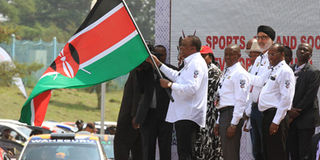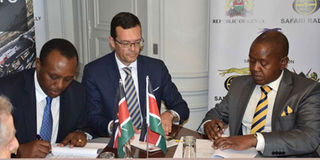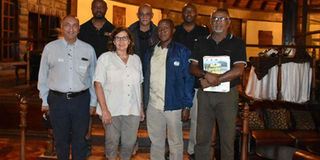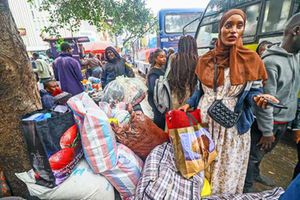Year in Review: World famous Safari Rally returns to WRC series
What you need to know:
- Kenya becomes the only African country to host one leg of global rallying championship
- Positive assessment of Kenya’s candidate event by 1983 Safari Rally competitor Mouton in July, and diplomacy played key role in convincing FIA and WRC promoters of the country’s organisational skills and financial capacity
The return of the Safari Rally to the high-profile FIA World Rally Championship (WRC) after a 17-year absence was one of the sporting highlights of 2019 in the world with President Uhuru Kenyatta playing a very crucial role both financially and in kind.
The Safari marked the rebirth of rallying in Africa and the news was delivered by President Kenyatta in a televised video link message from New York to Kenyans on September 27 at Kenyatta International Convention Centre (KICC) after the FIA World Motorsport Council approved WRC Promoter’s calendar, which also brought in Japan and New Zealand while Australia, Corsica and Spain were dropped from the circuit.

President Uhuru Kenyatta flags off the 2019 KCB Safari Rally at the Moi International Sports centre, Kasarani on July 5, 2019. PHOTO | ANWAR SIDI |
The Safari Rally will be based in Nairobi, with the Service Park at Kasarani Stadium and stages located near Lakes Naivasha and Elementaita, north-west of Nairobi in the Great Rift Valley in closed road sections repeated twice thus giving fans an opportunity to watch the action at close range.
“Before my administration assumed office in 2013, I made a promise to the people of Kenya to return the Safari Rally to the International Automobile Federation World Rally Championship family,” said the President, who is the patron of the WRC Safari Rally Project, a joint venture between the Sports Ministry and the Kenya Motor Sports Federation, formed two years ago to drive this agenda.
Although changed to conform to modern-day WRC format, the Safari character will not be compromised with plans in place for challenging closed dirt road sections, stunning picture-postcard scenery and exotic teeming wildlife on the floor of the Rift Valley especially in Soysambu and Kedong sections.
“This process has taken us seven years,” said the President while fulfilling his promise which he had described a “National Heritage.”
Like all big events, diplomacy and lobbying also played a central role but, in the final analysis, Kenya had to present a good bid using a candidate event which convinced the Fédération Internationale de l'Automobile (FIA) and WRC Promoter, the marketing firm of the WRC, of its organisational skills and financial capacity.
“I want to take this opportunity to thank the President of the International Automobile Federation, Mr Jean Todt, the World Rally Championship Promoter Mr Oliver Ciesla, the Chairman of the Kenya Motorsports Federation, Mr Phineas Kimathi, and the Directors and Technical teams, for working with my Ministry of Sports, Culture and Heritage through the World Rally Championship Safari Rally project, to deliver this iconic event that forms part of our national heritage,” said the President.
Behind the scenes, a lot of work had been going on since 2017 when the government gazetted the WRC Safari Rally Project, a gesture acknowledged by Todt and Ciesla.

Former Sports Principal Secretary Kirimi Kaberia (left) and World Rally Championship (WRC) Safari Rally Project chief executive Phineas Kimathi (right) sign a deal with World Rally Championship Promoter Oliver Ciesla managing Director Oliver Ciesla in Paris on June 21, 2018. PHOTO | PETER NJENGA |
FIA sent Michelle Mouton, a third-placed finisher in 1983 Safari Rally, to inspect the route in May. There were changes to the route, and she also returned a favourable report on safety aspects during the candidate event held from July 5-7).

The Safari Rally Team in Naivasha after the route survey. From left, front row: Surinder Thatthi, Michelle Mouton, Phineas Kimathi, Anwar Sidi: Back row: Norris Ongalo, Nazir Yakub and George Mwangi. PHOTO | CORRESPONDENT |
EXPERTS
Earlier the WRC Promoter sent two experts Iain Campbell of Britain and Finnish rally ace Jarmo Lahtinen to check proposed 2020 WRC Safari route and also train Kenyan officials. They worked closely with the organizing team in bringing to date requirements of a WRC event.
Finally, Sue Sanders from UK trained safety officials later impacted similar knowledge to local marshals, some of them university students who officiated in the Candidate event.
Several officials were also trained in Europe practically in WRC events in the last two years.
Todt has visited Kenya thrice on various missions and twice met President Kenyatta at State House. Before the big announcement, he paid the Head of State a courtesy call during his state visit in Kingston, Jamaica where he was the chief guest in the country's 57th independence celebrations. Both used the occasion to firm up the future of a WRC Safari Rally.
Unlike in the past where WRC status for other countries was announced in press releases, for Todt the Kenyan situation was special. He decided to deliver the news of the return of the Safari Rally via a televised video link from Geneva, Switzerland, the same day President Kenyatta made the big announcement.
“It is my great pleasure to announce to the President of Kenya Uhuru Kenyatta, that his personal pledge to deliver the Safari rally back into the top of world rallying has been achieved. Congratulations,” said Todt, who came third in 1973 Safari Rally with Timo Makinen.
“But its return holds as much importance on a global level. Africa’s absence from the WRC for almost two decades has been significant and the championship’s return to the world’s second-biggest continent is a landmark achievement in our strategy to further globalise the series,” she said.
“I really count on President Kenyatta’s leadership and all the Government of Kenya to put that amongst the priority of the country. So let's work for improving Road Safety. Let's work to welcome the most iconic World Rally Championship rally in Kenya back. God bless you and you will have all our support. Thank you.”
Looking forward to 2020, the Safari Rally is expected to inject a substantial amount of money in the Kenyan economy estimated to be between Sh9 billion to Sh10 billion through tourism arrivals, ground expenditure and international television exposure in 150 countries.
WRC promoters will produce live coverage of the Safari Rally and pre-event publicity for seven days, all valued at Sh4 billion of free publicity for Kenya, with tourism being the biggest beneficiary as more than 70 million people to be reached, said Ciesla.
Additionally, more footage will be aired in the 10 million subscription WRC+ TV channel which cumulatively will reach over 800 million TV viewers worldwide.
Alongside the world’s best drivers in fire-spitting multi-million shilling cars, Safari Rally’s windfall is projected to spill over to poultry farms in Kiambu, banana growers in Kisi, livestock owners in north eastern all the way to fruit farms in Kitui.
The teams will have at least 2,000 personnel who will be booked in Nairobi, Naivasha and Nakuru. Travelling fans are estimated to be between 40 to 140,000.
While drivers and their crews will be flown in, giving Kenya Airways the much-needed cash inflow, the other biggest beneficiary of the Safari Rally will be Kenya Ports Authority which will clear cargo and the Standard Gauge Railway which will haul 65 40-feet containers in two trains to Suswa and back to the port of Mombasa.




